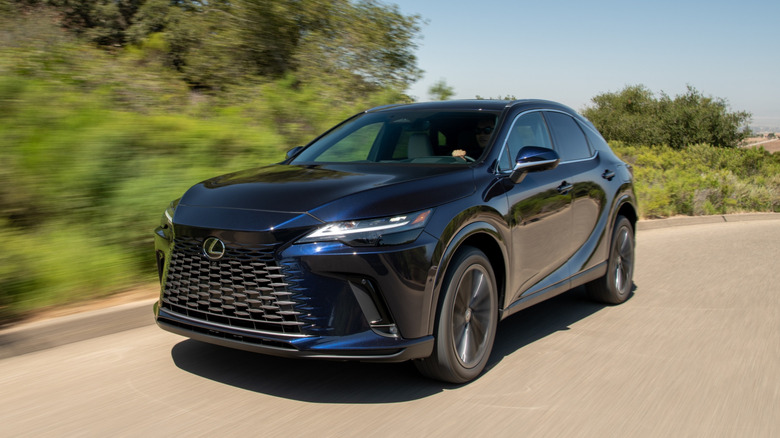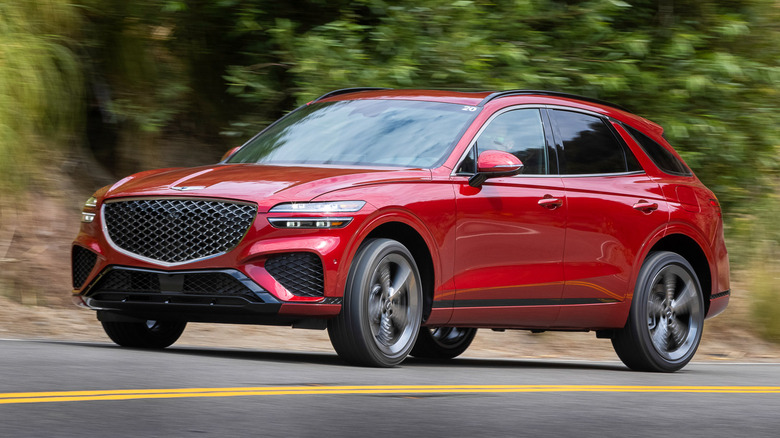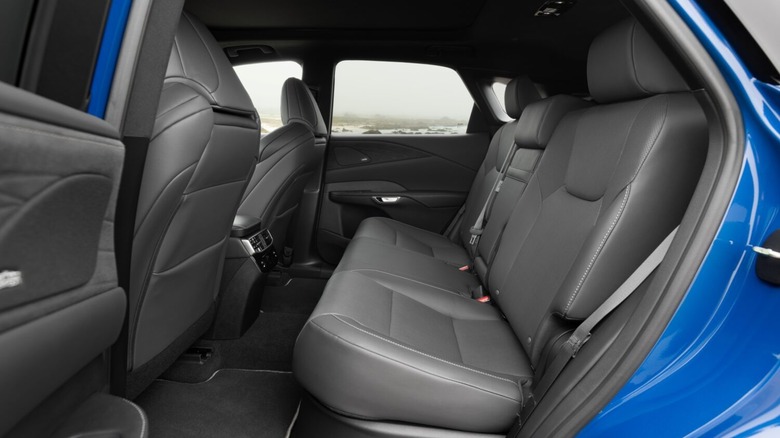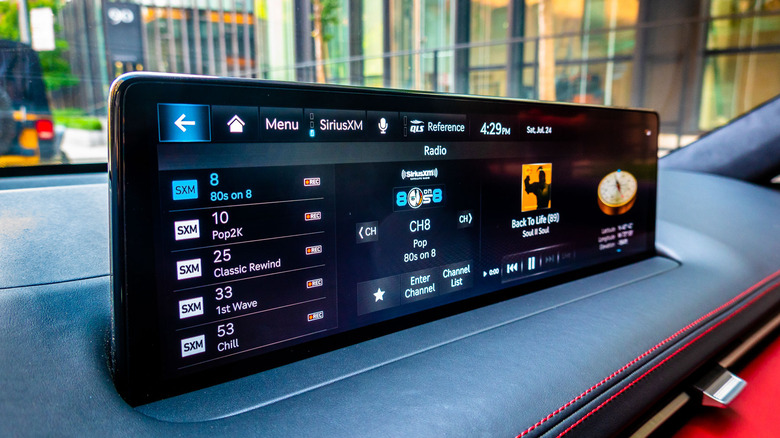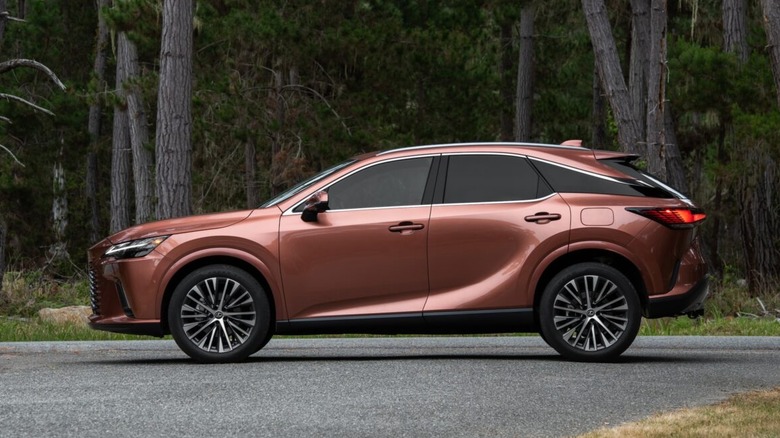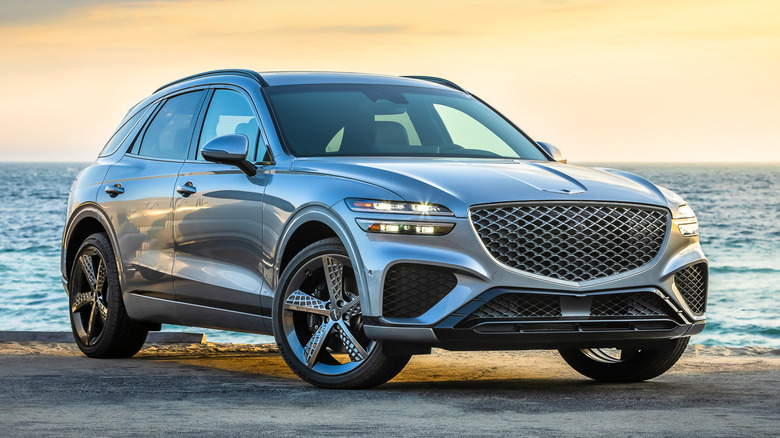Lexus RX 350 Vs. Genesis GV70: How Do These Luxury SUVs Compare?
The Lexus RX is one of the most reliable SUVs you can buy, and one of the most popular vehicles that Lexus sells. Many (most notably, Lexus themselves) consider it the first luxury crossover ever. According to Lexus, it's been the best-selling mid-luxury SUV for the last 26 years running. Its long-standing combination of family-friendly utility and premium build quality put it amongst the most successful models in Lexus history.
By contrast, the Genesis GV70 is a relative newcomer to the luxury crossover class. The GV70 was introduced in 2020 but during its short time on the market, the GV70 has won several industry awards and in SlashGear testing, it has received high marks for its impressive powertrain and attractive aesthetics. Genesis also touts it as their most popular vehicle in North America, with impressive sales over just three short years on the market and a refreshed model on the horizon for 2026.
So how do these two models compare? Which one is more appealing when you start stacking up price sheets, available powertrains, fuel economy numbers, and safety stats? For this comparison, we're going to pay attention to the RX 350 and the GV70, specifically leaving out the all-electric GV70 as well as the plug-in hybrid RX450h+ and the higher-performance RX 500h. That should help narrow the scope of this comparison, keeping the focus on these two luxury crossovers without comparing apples and oranges.
Powertrain choices and performance
With the standard turbocharged 2.4-liter four-cylinder engine, the RX 350 produces 275 horsepower and a robust 317 lb-ft of torque. According to Lexus, that power will get a front-wheel drive RX 350 from zero to 60 mph in 7.6 seconds, with the all-wheel drive model making the sprint in 7.2 seconds. The offers a bit less power, so it's naturally a bit slower. With the combination of a 2.5-liter four-cylinder engine and two electric motors, the RX 350h produces 246 hp and 233 lb-ft of torque. According to Lexus, that puts the RX 350h's acceleration run from zero to 60 mph at 7.4 seconds.
Powertrain choices for the Genesis GV70 are a bit different. With the electrified model also available, the GV70 doesn't offer a hybrid or plug-in hybrid variant. Thankfully, the standard GV70 is pretty robust. The standard GV70 comes with a turbocharged 2.5-liter four-cylinder engine that produces 300 hp and 311 lb-ft of torque. The optional twin-turbo 3.5-liter V6 makes an impressive 375 hp and 391 lb-ft.
When Car and Driver tested the 2.5-liter GV70, it went from zero to 60 mph in just 5.6 seconds. The twin-turbo V6? It did the dash to 60 mph in just 4.9 seconds. There are, of course, other powertrain choices for the RX: the plug-in hybrid 450h offers 304 hp and the high-performance 500h has 366 hp. Even those RX models though, fall behind the GV70 when it comes to sheer power.
Cargo space and interior space
On the inside, both of these SUVs are relatively spacious for the driver and for passengers, but there are some differences in dimensions that are worth noting. From nose to tail, the RX 350 measures 192.5 inches long (just over 16 feet) while the Genesis measures 185.6 inches long. Despite the fact that the RX is nearly 7 inches longer than the GV70, they are nearly dead-even when it comes to cargo space measurements. The RX has 29.6 cubic feet of cargo space behind the rear seats, and the GV70 offers 28.9 cubic feet of space. It's more than enough for a few carry-on bags, and those numbers are on par with other luxury SUVs like the Acura RDX, which offers 29.5 cubic feet of cargo space.
Front and rear legroom are pretty much even as well. The Lexus offers 41.1 inches of front legroom, 37.4 inches of rear legroom. The Genesis checks in at 41.3 up front and 37.2 in the rear. Headroom and shoulder room are all similar stories. These dimensions translate into plenty of space for adults in all four main seating positions. Even these SUV's middle seats in the second row are large enough for most adults. Unless you're worried about fitting your midsize luxury SUV into a particularly tight parking space, the interior and exterior dimensions for both these SUVs should work for most families.
Pricing comparison
Pricing is a pretty wide spectrum when it comes to these two luxury SUVs, especially when you consider how many trim levels there are. The 2025 base RX 350 with front-wheel drive starts at $50,325 (including $1,350 destination fee) and goes up from there. Top-trim models like the RX 350h Luxury with all-wheel drive have an MSRP of $63,270 (including destination). Meanwhile, the base-trim 2025 GV70 has a starting price of $46,200 (including $1,450 destination fee). Upgrade to the 3.5T Sport Prestige, and the GV70's MSRP is knocking on the door of $70,000 – $69,850 to be precise.
Both SUVs offer a number of standard features — items like heated front seats, wireless Apple CarPlay and Android Auto, and adaptive cruise control. There are, however, some differences worth noting. The standard RX 350, for example, comes with a 9.8-inch touchscreen, while a larger 14.0-inch screen is optional. On the GV70, there's only one center touchscreen to be had, and it's the large 14.5-inch touchscreen. Generally, the GV70 offers a slight price advantage over the RX 350 when it comes to the availability of premium features, but it's a pretty close race between the two.
Fuel economy
With the different powertrains and configurations available from the RX and the GV70, there's a fair bit to sort through when it comes to fuel economy ratings. With the standard 2.5-liter engine, the 2025 GV70 gets two different ratings depending on equipment: 24 mpg combined (22 city/28 highway), or 22 mpg combined (19 city/26 highway). Go with the more-powerful 3.5-liter engine and fuel economy ratings drop to 20 mpg combined (18 city/24 highway). These are acceptable numbers, but not the best in the class — for that, you'd likely need a hybrid powertrain, which the Lexus is happy to provide.
Official fuel economy ratings for the 2025 Lexus RX aren't available yet, but they'll likely mirror the ratings from the 2024 model. With the standard 2.4-liter engine and front-wheel drive, the EPA estimates that the 2024 RX will return 25 mpg combined (22 city/29 highway). Add all-wheel drive to the equation and those numbers all drop by 1 mpg.
Those are admirable numbers for the class and certainly enough to outpace the GV70. Go with the hybrid model, though, and things get even better. The RX 350h has an EPA rating of 36 mpg combined (37 city/34 highway). That represents a serious fuel savings compared to either of the available powertrains from the GV70.
Safety ratings
The Lexus RX 350 receives impressive safety ratings from both the IIHS (Insurance Institute for Highway Safety) and NHTSA (National Highway Traffic Safety Administration). While they haven't rated the 2025 model yet, the 2024 Lexus RX was given a Top Safety Pick designation from the IIHS (ironically, their second-highest-possible designation), with the best-possible rating of "Good" in the small overlap, original moderate overlap, and side-crash tests.
Unfortunately, the RX received the lowest possible "Poor" rating in the IIHS' updated moderate-overlap front crash test. A quick caveat: the IIHS' newly-updated moderate overlap test places an additional test dummy in the rear seats, so some vehicles are scoring poorly on this test, but that trend will likely change in the coming years. NHTSA gave the RX 350 five stars (out of five possible) for overall crash test safety, with four out of five stars for frontal crash safety and five stars for side-crash protection.
The 2025 GV70 performed very well in the IIHS' tests, getting it the highest distinction of Top Safety Pick+. It received a Good rating in all possible crash-test categories, including the updated moderate overlap front crash test. The GV70, like the RX 350, also received five stars from NHTSA in the overall safety rating, with four out of five stars in the frontal crash test rating.
